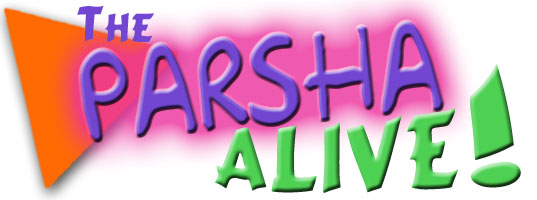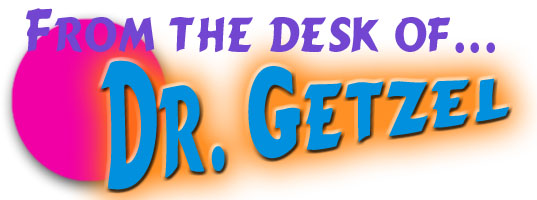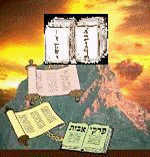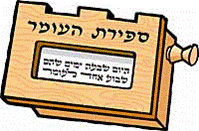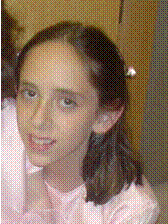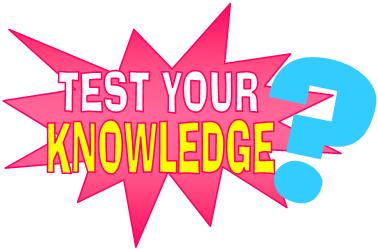 |
|||
|
Parshas Bamidbar
Volume 1 Chof Hey Iyar 5765 Issue 35 |
|||
|
Printable Version Printable Version Past Connections English Connections Yiddish Connections |
|||
|
The Parsha Alive Brain Buster Dr. Getzel Kids Speak Pocket Calendar Pirkei Avos Pointers Lag Baomer Stories of our Rabbeim Test your Knowledge |
|||
|
The
Connections people
With many thanks to
our generous sponsors:
Chinuch Yaldei
Hashluchim:
Connections:
Rabbi & Mrs.
Chinuch Yaldei Hashluchim:
Connections
Va’ad Hashluchim:
A project of
a division of
|
On Friday, Morah Kaplan asked her students which parshah would be read in shul this Shabbos. "I know," Riki called out. "It's Bamidbar." "Last year we read Parshas Bamidbar on the Shabbos before Shavuos. I remember, because my brother was called up to the Torah for his Bar Mitzvah that day. But this year it’s not the Shabbos right before Shavuos," exclaimed Dina. "Actually," Morah Kaplan told the class, "We always read Parshas Bamidbar either on the Shabbos right before Shavuos or on the Shabbos before that. Bamidbar means "in the desert." There is a strong connection between a desert and the Torah which we were given on Shavuos." "Oh, I remember learning about that," Miriam said. "The desert is open land. Nobody owns it. The Torah also does not belong to any one person alone. Every Jew has an equal share in the Torah." "Very good, Miriam," Morah Kaplan praised her. "And, girls, there are more things that we can learn from the fact that the Torah was given in the desert. Let's think what life is like in a desert." "It's hot." "No water." "Very little food." "Now, when our forefathers received the Torah in the desert, they had to depend on HaShem for all their needs - for food, water and clothing. But they didn't worry. Instead, they eagerly received the Torah with joy and trust. "We should learn this lesson from them. Even if we sometimes feel that we need things, we should not worry about them or let our needs disturb us from studying the Torah and doing mitzvos. We should trust HaShem and rely on Him to provide us with the things we need, just as He did for our ancestors in the desert." Chani raised her hand. "Morah, last summer I went to Eretz Yisrael and visited my cousins in a small town in the Negev desert. True, it was hot, but they had plenty of water and beautiful gardens and parks." Morah Kaplan nodded, "Our sages tell us that during the forty years the Jews journeyed through the desert, the desert changed so that even trees flowered and gave fruit. "Some people are like a desert. They feel empty and dry when it comes to holy things. They, too, can change. The Torah can help them grow full of feeling for HaShem, and become fruitful with good deeds." ‘Please Tell Me What the Rebbe Said’ (Adapted from Likkutei Sichos, Vol. VIII) |
||
|
|||
|
Dear Junior Shluchim Hmm…Aperture f /11, lens speed 1/5000, long focus…excuse me, let me just adjust this, and then I’ll explain what I’m doing. Aperture f / 8, lens speed 1/8000… I’m in the middle of working on my new super-magnificent lens, the one I told you about. It’s called the Lo-Lo Lens, and when you look inside of it, and you focus the lens, it takes back in time to a LOng, LOng time ago. Try it. It goes like this. Take an old pair of glasses, and spray them with Windex window cleaner. Then put them on until they slide to the end of your nose and close your eyes really tight. Turn off all other noises and turn on the imagination button inside your head. This is your LO-LO lens. Do you what I see? Oh wow, this is so exciting. I see lots of sand in my lens. Lots and lots of it. Hey look, there’s a sign that says “Sinai Dessert.” And that big mountain over there, the one with a gate around it, it must be Har Sinai. Do you see that tall man over there, near the mountain? Wow, there is a light shining from his face, and his eyes look so kind. Right now he looks very serious, as if something magnificatious is going to happen. He must be Moshe Rabbeinu. Oh golly, I see tons and tons and tons and tons of people. They stretch for a few miles. I see girls with freckles and boys with yarmulkas, and men with thick bushy brows and ladies holding tiny babies. I see grandmothers with knitting bags, and grandfathers with cigars. Wow, the people go on and on. They don’t even fit into this super cool lo-lo lens. Hey listen, it’s getting very quiet. The mothers and fathers, and boys and girls, and grandmothers and grandfathers all look very serious. The birds are quiet, the trees are still, and the butterflies are resting in the sand. Yikes, I see thunder! And double yikes, I hear lightning. I’ve seen lots of things, but I’ve never seen thunder before. And look, Moshe is climbing up the mountain. His face looks so bright, I need to turn away; the light might break my lens. Now, Moshe is up at the top. I know what’s going to happen next. I learned about it in Chumash with Rabbi Knowall. I know exactly what’s going to happen now. Hashem is going to come down and talk to all His children, and give us the whole Torah so that we could be close to Him forever. This is the greatest moment that ever was. MY HANDS ARE SHAKING... I better close my lens. Soon all the people are going to faint from hearing Hashem’s voice, and Mrs. Getzel will be upset if I faint. Do you also see the mountain of Sinai in your old-glasses-Windex-sprayed-lo-lo-lens? Isn’t it spectacular? Do you think I’ll win the Nobel Peace prize of Lens Formation for making this lens? Next week is Shavuos, the day Hashem came down to earth and gave us the Torah. And do you want to hear the best part? Rabbi Knowall told me that every year Hashem gives us the Torah again, so the Torah is always brand new. During next week, use your lo-lo lens and SEE the picture, what it must have been like when Hashem came down the first time. And get ready, because on Shavuos, it’s going to happen again... yippee!
Dr. Getzel |
|||
|
שבת after מנחה פרק חמישי |
Remember to count ספירת העומר! |
||
|
Chaya Posner, 11 My name is Chaya Posner and I am eleven years old. I have been on shlichus in Boston, Massachusetts all my life. My family has been on Shlichus on campus for nineteen years. Our Chabad House has six floors. We have a big room for meals and a shul. There are offices and apartments that people live in. People also sleep there on Shabbos. Every Shabbos and Yom Tov students come for davening and meals. They think we are so cute. I never know who is going to come but I always meet interesting people. We also have lots of nice programs for the students. We have Rosh Chodesh programs and many weekly classes. When the students come to our house all my siblings and I smile at them. We talk to them and they like us a lot. We had a big Purim party. Lots of people come and have fun. I went to the Kinus and I made friends with lots of Shluchos from all over the world. I keep in touch with some of them. It is nice to have friends that are in the same situation as me. I am proud to be able to do this work for the Rebbe. I am sure that we will be successful and be able to bring Moshiach speedily in our days.
|
|||
|
|
The תורה tells us that the Jewish people arrived at הר סיני on ראש חודש and began to prepare themselves for מתן תורה on that very day. Every year, on ראש חודש סיון, we must remember once again what happened on that ראש חודש סיון. Every Jewish child should tell ה‘ that he is getting ready for מתן תורה just as the Jewish people did the first time. How does he tell ה‘? By making a החלטה to go even higher in learning תורה and doing מצוות. When ה‘ gave the Jewish people the תורה they faced הר סיני and called out together ‘נעשה ונשמע!-We will do and we will hear.’ The Jewish people said ‘נעשה’ before ‘ונשמע.’ They promised to first do what ה‘ commanded and only later would they ask questions and try to understand the reason for His commandments. Every year, when we get ready for מתן תורה, we must accept the תורה just as the Jewish people did then—in a way of ‘נעשה ונשמע.’ And this is exactly why Jewish children are called ‘צבאות ה‘—The army of ה‘!’ In every army all soldiers have to obey the Commander-in-Chief without questions. Jewish children must obey ה‘ in a way of ‘נעשה ונשמע.’ They must do everything ה‘ tells them, with devotion and מסירת נפש. Only after they have obeyed can they try to understand the reason for ה‘’s מצוות. When ה‘ sees how Jewish children are preparing to receive the Torah even before שבועות, and they do so with joy and חיות, ה‘ himself once again prepares to give the תורה to the Jewish people, amidst great joy. Then ה‘ blesses us with everything we need, and He will take us out of גלות, marching straight and tall, to welcome משיח צדקינו. (Adapted from The Rebbe Speaks to Children)
|
||
|
Why does this משנה use the title of אברהם אבינו when in משנה ב‘ he is simply called אברהם? A father passes on his גשמיות & רוחניות strengths and abilities to his children. The משנה, by writing “אבינו” - "our father," is teaching that אברהם who was the first person to be tested by ה‘, gave over to his children the strength and ability to go through tests and to pass them. אברהם led the way for all his descendants, and because of him we have the ability to overcome all the challenges ה‘ places before us. We are able to have the same unquestioning devotion and dedication to ה‘ and the same מסירת נפש to fulfill what ה‘ wants. (Adapted from Vedibarta Bam) |
|||
|
This Shabbos is שבת מברכים חודש סיון
שבת
morning I made sure to say
תהילים.
(Remember to do your quota for the
World-Wide Tehillim club)
ראש חודש אייר Monday - ל‘ ניסן Tuesday א‘ אייר - I remembered to say יעלה ויבוא in שמונה עשרה and in bentching
I remembered to say
הלל
after
שמונה עשרה I remembered to say ברכי נפשי after the שיר של יום (For Girls) I didn’t sew or do any laundry |
|||
|
|
|||
|
Last Week's Winners:
Level 1:
Level 2:
|
|||
|
We'd love to hear your
feedback! Send us your comments, ideas and suggestions to:
connections@shluchim.org Click here for a printable version of Connections in PDF format |
|||
